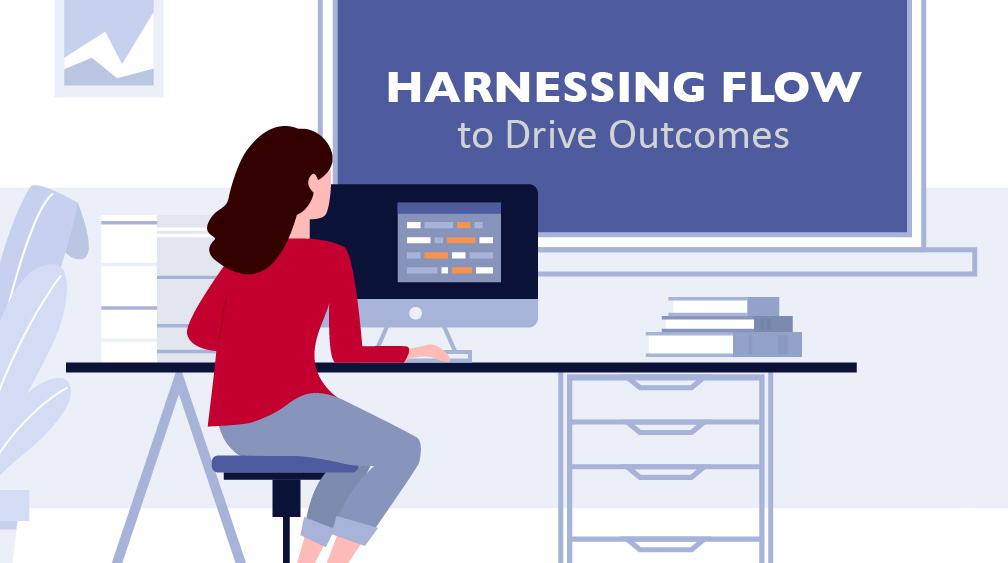Remember back to a time when you focused on a particular task so wholly that time melted away. Upon the wildly successful completion of said task, you snapped back to yourself only to realize that the sun had set, your belly was clamoring for cheese fries, and you had 71 unread messages on the group text.
In that moment you experienced a concept called “flow.”
“Flow” is a mental state where a person channels an energized and radical sense of focus and enjoyment into a task or activity. Experiences that trigger a state of flow are equal amounts challenging and demanding of our highest skill level – not too much or too little of either.
These experiences push your limits just slightly, which creates a sense of excitement around what’s possible. As a result of entering a flow state, individuals are fully immersed in a feeling of energized focus, full involvement, and enjoyment in the process of the activity.
In essence, flow is characterized by complete absorption in what one does, and a resulting transformation in one’s sense of time and self.
The human nervous system can only process about 110 bits of information per second. Listening to one person speak occupies over half of your mind’s total bandwidth. This explains why we can’t focus on and comprehend more than one person talking at once, and it also frames why many or all of our bodily sensations and external distractions melt away when we enter a flow state. When in flow, we are incapable of monitoring our hunger or fatigue, conflict with those we care for – even our self-consciousness and ego. Essentially, our brains turn off access to many cognitive functions in order to remain engrossed in one singular task.
With this in mind, how might we increase the likelihood of accessing flow states in everyday life? Here are three things to increase those chances:
Stretch your limits – but not so far something breaks
If you find yourself performing tasks or focusing on areas that you can do in your sleep, chances are it’s time to push your limits. Flow states are most accessible when a task requires you to lean out over a skill precipice, but not so far that you’re likely to plunge over the edge.
Choose what supercharges you and ruthlessly eliminate distraction
Deeply understand the environment and factors you require in order to focus and tune into flow best and most often. To practice this, identify and stop doing tasks and activities that bore you: outsource, say “no” to energy drains, and eliminate any non-necessary tasks that feel like chores. Simultaneously, try at least three new tasks, activities or experiences each month. After each of these new experiences, ask yourself: “What specifically did I like about this task, activity, or exercise? What parts didn’t I enjoy?” Record your findings in a way that makes sense to you. Treating these experiences as a lab for evaluating your focus and enjoyment will drastically increase your chances of accessing powerful flow states.
Recharge your mindfulness batteries early and often
No matter how packed your schedule is, the more in balance you are, the more likely you are to achieve flow. Prioritize a walk around the block, seek out and engage with a friend or colleague you wish you spent more time with, or just find a quiet space where you can set aside the day’s rigors for a few minutes.
So how does this apply to your everyday work?
Organizations – not just individuals – can embody flow. Would you like to learn how to create more flow for your teams in your daily work? Part two of this series will talk about creating flow across teams. For now, consider this – seventy years ago Sony drafted this Purpose of Incorporation statement:
“To establish a place of work where engineers can feel the joy of technological innovation, be aware of their mission to society, and work to their heart’s content.”
Sony’s mission says nothing about transistors, radio receivers – technology of any kind. Instead, their words inspire, challenge, and give permission to seek contentment through a profession – in essence, flow in practice in the work environment.
Do you have a story to share about a flow state? Do you want to collaborate on flow, achievement, or purpose? Reach out to me at hans.manzke@theclearing.com.
